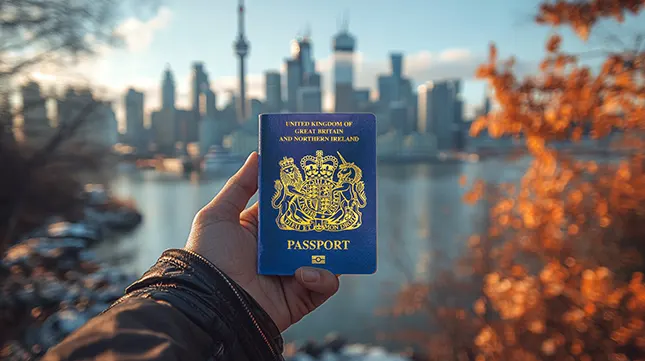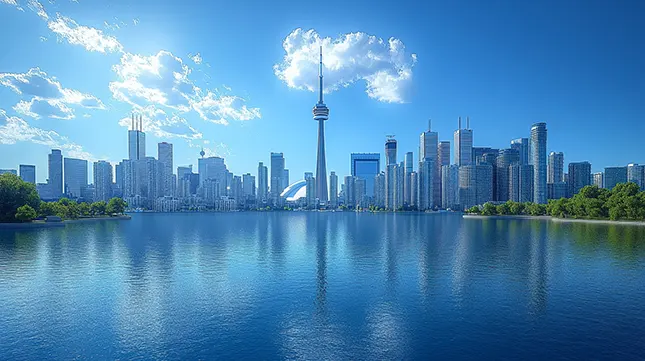Moving to Canada from UK – A Complete How to Guide

Embarking on a journey from the UK to Canada opens the door to a world of new possibilities and experiences.
Imagine trading the familiar British landscapes for Canada’s majestic mountains, vibrant cities, and vast wilderness.
It is an intriguing thought that many Brits look forward to.
Not only does Canada boast breathtaking natural beauty, but it also offers a high quality of life, with excellent healthcare, education, and a welcoming multicultural society.
For those seeking career advancement, personal growth, or a fresh start, Canada presents a land rich in opportunities.
Relocating at home is hard enough, but moving to a completely different country will undoubtedly put you out of your comfort zone.
However, if your relocation is well planned and you have conducted thorough research about Canada to ensure you meet the requirements for a visa, there is no reason why it cannot work out for you.
In our Moving to Canada from the UK guide, we will navigate you through the essential steps and considerations for making a successful move, ensuring you’re well-prepared to embrace this exciting chapter in your life.
Why Choose Canada?
Canada consistently ranks among the top countries in terms of quality of life.
Its robust economy, low crime rates, and emphasis on family and community make it an attractive destination for people from all walks of life.
The country is known for its friendly residents and cultural diversity, providing a warm welcome to newcomers.
Whether you’re drawn to the bustling streets of Toronto, the coastal charm of Vancouver, or the cultural heritage of Montreal, there’s a place in Canada that can feel like home.
Understanding Visa and Immigration Requirements

There are some key things you need to know about visas making the move to Canada.
Obtaining visas can be daunting and overly complicated. However, Canada has set ambitious goals to welcome over 360,000 new immigrants between 2025 and 2027.
With one of the world’s most open and dynamic immigration systems, Canada offers more than 100 different pathways to entry.
Everyone’s path to Canadian immigration will be unique.
By far, the two most popular are the economic immigration and family sponsorship visas.
Before making the move, it’s crucial to navigate Canada’s immigration system so that you can decide which visa best suits your personal circumstances and experience.
- Express Entry System (FSWP): Federal Skilled Worker Program. Designed for skilled workers, this points-based system evaluates candidates on factors like age, education, work experience, and language proficiency.
- Provincial Nominee Programs (PNPs): Each province has its own immigration streams targeting specific needs. For example, Alberta’s PNP focuses on trades and engineering professionals.
- Family Sponsorship: If you have family members who are Canadian citizens or permanent residents, they may be able to sponsor you.
You will need to have all the necessary documentation ready, including valid passports, birth certificates, and financial evidence, such as bank account information, to satisfy the Canadian Government that you are eligible for a visa.
Use a Certified Immigration Agent

An immigration agent can help make your move far easier.
If all the red tape is a little overwhelming for you, find a good immigration agent to assist.
Using an immigration agent offers several advantages when applying for visas to emigrate from the UK to Canada.
These professionals are experts in Canadian immigration laws and stay updated on any changes in policies or procedures.
They can help you navigate the complex array of visa options to identify the most suitable pathway for your specific situation, whether it’s through skilled worker programs, family sponsorships, or business immigration streams.
An immigration agent can assist with accurately completing and submitting all required documentation, minimising the risk of errors that could lead to delays or rejections.
They also provide invaluable personalised guidance throughout the process, helping you prepare for interviews and addressing any concerns that may arise.
By leveraging their expertise, you can save time and reduce stress, significantly increasing your chances of a successful application and a smooth transition to your new life in Canada.
Your Path to Canadian Citizenship: Making Canada Your Home

To become a Canadian citizen you need to meet certain criteria.
Once you have secured your visa and arrived in this incredible country, deciding to embrace Canada as your permanent home is an exciting step!
To become a Canadian citizen, you’ll need to meet a few essential criteria.
First, ensure you’re a permanent resident and have lived in Canada for at least three out of the last five years.
Remember to file your taxes during this period, as they are a crucial part of your application.
Next, you’ll need to prove your language skills in either English or French and pass a citizenship test that covers Canada’s history, values, and institutions.
Once you’ve got these checked off, you can apply online to become a citizen.
After submitting your application, you might be asked to provide fingerprints for background checks.
If all goes well, you’ll be invited to a citizenship ceremony to take the Oath of Citizenship, officially making you a Canadian!
For more detailed information and to start your application, visit the Government of Canada’s official website
Canadian Employment Opportunities

You will find that there are some excellent employment opportunities in Canada.
Finding a job in Canada is a crucial milestone for a successful transition from the UK.
Adopting a strategic approach tailored to the Canadian job market is essential to enhancing your employment prospects.
Start by leveraging reputable job search websites such as Indeed Canada and Monster Canada.
These platforms host a wide array of job listings across various industries and regions, allowing you to filter opportunities based on your skills, experience, and preferred location.
Regularly updating your profile and setting up job alerts can help you stay informed about the latest openings that match your criteria.
Professional networking plays a pivotal role in the Canadian job landscape.
Building connections through LinkedIn by joining industry-specific groups and participating in discussions can increase your visibility to potential employers.
Additionally, attending virtual networking events, webinars, and industry conferences provides valuable opportunities to meet professionals in your field, exchange knowledge, and discover job leads that may not be advertised publicly.
Engaging with local chambers of commerce and professional associations can also open doors to exclusive networking events and job fairs.
Check Your Qualifications
Another important aspect is the recognition of your professional credentials.
Canada places significant emphasis on ensuring that qualifications meet national standards, especially in regulated professions such as healthcare, engineering, and education.
Visit the Canadian Information Centre for International Credentials (CICIC) to understand the requirements for your specific profession.
This organisation provides resources and guidance on the credential assessment process, helping you determine if additional certifications or examinations are necessary to practice in Canada.
Ensuring your qualifications are recognised enhances your employability and demonstrates your commitment to adhering to Canadian standards.
Moreover, tailoring your resume and cover letter to align with Canadian expectations can make a substantial difference.
Highlight your relevant experience, skills, and accomplishments in a clear and concise manner, emphasizing how they meet the needs of Canadian employers.
Consider seeking feedback from Canadian career advisors or utilizing online resources to refine your application materials.
Preparing thoroughly for interviews by researching the company and understanding the local workplace culture will also boost your confidence and performance during the hiring process.
This comprehensive approach improves your visibility to employers and equips you with the necessary tools to navigate the Canadian job market successfully.
Cost of Living Comparison

There are some big differences in the cost of living in the UK and Canada.
When comparing the cost of living between Canada and the UK, Canadians experience a similar overall financial landscape, though there are notable differences to consider.
In the UK, living expenses tend to be higher in urban centres, whereas in Canada, costs are generally elevated in rural areas.
This distinction can influence your budgeting depending on where you choose to reside.
For example, fuel prices. One litre of fuel in Canada costs £0.90, compared to the UK’s average cost of £1.61 per litre, which can lead to significant savings on transportation costs.
Public transport in Canada is cheaper than in the UK; a monthly bus pass in Canada is around 20% cheaper, and daily rail tickets are around 12% cheaper.
Additionally, 20 cigarettes in Canada are around £5.00 less expensive, and monthly utility bills are over half that of the UK, offering substantial reductions in household expenses.
However, certain everyday food items may cost more in Canada.
Milk, bread, cheese, potatoes, tomatoes, onions and lettuce are all more expensive in Canada.
Despite these higher food costs, there are other areas where you can save money in Canada.
Childcare services, school fees and dining out are generally more affordable, helping to balance your overall budget.
Canadian wages tend to be slightly lower than those in the UK. The average monthly salary in Canada is approximately C$2,220 (£1,244), while in the UK, it stands at £2,435 (C$1,364).
Overall, the cost of living in Canada is comparable to that of the UK, with each country offering its own set of financial advantages and challenges.
NOTE: These figures are based on data from Numbeo as of December 2024 and are subject to change.
Check out our other article for a more in-depth look at the cost of living in Canada.
Moving to Canada with Children

Moving to Canada with children will present some different challenges.
Moving abroad with children adds another dimension to emigrating.
You will need to be sure that they receive a decent education in Canada. You won’t be disappointed here.
Moving to Canada provides access to a renowned education system, perfect for families and individuals seeking quality education.
Children must attend school between the ages of 6 – 18 years.
Public schools offer excellent education at no direct cost and are managed by each province.
For detailed information, visit Ontario’s Ministry of Education.
Higher education in Canada is highly esteemed, with universities like the University of British Columbia and the University of Toronto offering a wide range of programs and research opportunities.
Additionally, colleges such as Seneca College provide specialised technical training.
You may wish to opt for your children to attend an international school. Tuition fees for international students generally range from CAD 20,000 (£11,000) to CAD 40,000 (£22,500) per year, depending on the institution.
Canada also supports international students through resources like UBC International Students and McGill’s International Office, ensuring a smooth educational journey and opportunities for post-graduation work permits.
For younger children, early childhood education (ECE) programs are designed to support their development, and each province manages its own ECE system.
From nursery to university, Canada provides an extensive and well-organised series of education programs that, for the most part, exceeds the UK.
Canada’s Economic Landscape in 2024
Canada remains a formidable force in the global economy, underpinned by a dynamic service sector and abundant natural resources.
As reported by Investopedia, Canada secured the 9th spot among the world’s strongest economies in 2023, closely trailing the UK, which held the 6th position.
Diverse industries, including finance, technology, energy, and natural resources like timber and minerals, drive this economic strength.
In 2023, Canada faced economic headwinds, with rising interest rates contributing to slower growth.
However, the nation is swiftly adapting to the digital revolution, embracing advancements in technology and innovation to stay competitive on the global stage.
The shift towards a digital economy is creating new opportunities in sectors such as fintech, e-commerce, and green technologies, positioning Canada for sustained growth.
Looking ahead, economic recovery is anticipated by the end of 2024, supported by strategic investments and government initiatives aimed at fostering innovation and sustainability.
For a comprehensive forecast, explore the insights available on the Oxford Economics website.
Canada’s resilience and ability to evolve ensure it remains a top contender in the world economy, offering promising prospects for both businesses and individuals.
Currency Exchange Rate from CAD to GBP
Exchange rates are inherently volatile, constantly shifting up and down due to various economic factors.
If you’re planning to purchase a home in Canada and expect to transfer a significant amount of money, it’s crucial to keep a close eye on exchange rates.
Timing your transfer strategically can ensure you receive the best possible value from the prevailing rates, potentially saving you a substantial amount.
While banks are a common choice for currency exchanges, specialised FX firms (such as Halo Financial) offer distinct advantages:
- Competitive Rates: FX firms often provide more favourable exchange rates compared to banks, meaning you get more Canadian Dollars for your British Pounds.
- Lower Fees: Banks typically charge higher fees for international transfers, whereas FX firms tend to have lower or even no hidden costs.
- Personalised Service: FX firms can offer tailored advice and strategies to help you make the most of market movements, ensuring your transfer aligns with your financial goals.
- Speed and Efficiency: Many FX firms specialize in swift transactions, ensuring your funds reach Canada quickly and securely.
By partnering with an FX firm, you can maximise the value of your money transfer, making your investment in a Canadian home more affordable and financially sound.
Banking in Canada

Make sure you have set up your banking in Canada.
Before relocating to Canada, it’s crucial to find a safe and efficient method to transfer your funds.
Canada boasts one of the world’s most stable banking systems.
You’ll also have access to numerous reputable banks, including the Bank of Montreal, Royal Bank of Canada, and Toronto Dominion Bank—three of the globe’s top 25 banks.
Opening a Canadian bank account before your arrival is highly recommended.
This proactive step not only simplifies your move but also provides the necessary proof of funds required by immigration officials. With a local account, you can manage your finances seamlessly from day one, ensuring a smooth transition.
For a comprehensive “how-to” guide on opening an account from the UK, visit PocketPence.
Important: If you plan to carry more than CAD $10,000, be sure to declare it to avoid seizure by the CBSA.
Renting in Canada: Your First Step to a Smooth Move

Renting a home can be a great choice to get a feel for an area.
Even if you plan to make Canada your permanent home, renting for the first year is a smart move. This approach allows you to explore different neighbourhoods, towns, and cities to find the perfect fit before committing to buying a property.
Whether you’re eyeing vibrant cities like Toronto and Vancouver or charming smaller towns, renting provides the flexibility to settle into the community that suits your lifestyle best.
Finding rental properties is straightforward.
Listings are available in local newspapers, online classifieds, and websites like Realtor.ca and PadMapper.
Landlords may request proof of employment or conduct credit checks to ensure financial stability, but many are welcoming to newcomers and understand the challenges of relocating.
Rental costs vary significantly across provinces and cities.
For example, in Ottawa, the average rent for a one-bedroom apartment is approximately C$2,006 (£1,127) in the city centre and C$1,765 (£991) outside.
Meanwhile, Montreal offers more affordable options, with city-centre rents around C$1,698 (£954) and C$1,356 (£761) in suburban areas, according to Numbeo.
Renting initially not only eases your transition but also gives you the time to make informed decisions about where to settle long-term.
Take advantage of this period to immerse yourself in Canadian culture and discover the best place to call home.
A Guide to Buying a Home in Canada

Follow these tips if you are considering purchasing a home.
Once you’ve chosen your ideal Canadian destination, the exciting journey of buying a home begins.
Whether you’re a permanent resident or planning to become one, various financing options are available to suit your status.
Navigating the Canadian real estate market can be complex, especially if you’re unfamiliar with local processes.
That’s where a trusted local estate agent comes in handy.
A knowledgeable realtor can guide you through the intricacies of purchasing a property, from understanding market trends to managing fees and paperwork.
Working with a Canadian realtor simplifies the buying process, eliminating many challenges associated with purchasing property from abroad.
You can find reputable agents through online platforms like Realtor.ca or even the traditional Yellow Pages if you prefer.
Be prepared for additional costs similar to those in the UK, including legal fees, notary services, and closing costs.
Planning for these expenses ensures a smooth transaction. For a comprehensive “how to buy a home in Canada” guide, visit the Government of Canada’s official website.
Pro Tip: Consider getting pre-approved for a mortgage to strengthen your position when making an offer.
This step can give you a competitive edge in Canada’s dynamic real estate market.
Buying a home in Canada will be a significant milestone for you.
With the proper guidance and preparation, you’ll find a property that perfectly matches your needs and dreams.
Thriving in Canada’s Dynamic Work Environment

There is a great opportunity for you to excel in your new job in Canada.
Working in Canada provides access to a wealth of benefits that enhance your professional and personal life.
As part of the Canadian workforce, you’re entitled to a robust pension plan, paid parental leave, employment insurance, and even coverage for eye exams.
Canada’s stringent employment laws ensure that workplace health and safety are top priorities, creating a secure environment for all employees.
Beyond the essentials, Canada celebrates work-life balance with generous public holidays—typically ten days annually, with some provinces offering additional days.
The country is also renowned for its inclusive and diverse workplaces, fostering innovation and collaboration across various industries.
Whether you’re in tech, healthcare, or creative fields, Canada supports your career growth with ample opportunities and resources.
For more details on employee rights and benefits, visit the Government of Canada’s Employment and Social Development website.
Pro Tip: Embrace the multicultural workspaces in Canada to broaden your professional network and gain diverse perspectives that can propel your career forward.
Demystifying Canadian Taxes: What Newcomers Need to Know

Understanding Canadian taxes is essential.
Understanding the tax system is crucial for a smooth financial transition.
Canada’s tax structure, much like the UK’s, is mandatory and progressive, managed by the Canada Revenue Agency (CRA).
In your first year as a resident, the CRA classifies you as a newcomer, which can affect your tax obligations and benefits.
Canada has five federal tax brackets for 2023:
- Up to $55,867: 15%
- $55,867 to $111,733: 20.5%
- $111,733 to $173,205: 26%
- $173,205 to $221,246,752: 29%
- Above $246,752: 33%
Beyond federal taxes, you’ll also need to account for provincial income taxes, which vary by province and follow a similar progressive structure.
This means higher incomes are taxed at higher rates, both federally and provincially.
To get a complete picture of your tax responsibilities, visit the Canada Revenue Agency website. Here, you can find detailed information on tax brackets, credits, and deductions to help you maximise your returns and minimise liabilities.
Consulting with a Canadian tax professional can also provide personalised strategies to optimise your tax situation.
Embracing Canada’s Seasons

It may take some time to adjust to the weather when moving to Canada.
Canada’s vast landscape means the weather is as diverse as its culture.
One of the country’s delights is experiencing all four seasons in their full splendour, though their intensity varies by region.
Winter typically spans December to February, transforming much of the nation into a snowy paradise ideal for skiing.
Resorts like Whistler become bustling hubs for tourists drawn by heavy snowfalls and pristine slopes.
If you’re not a fan of freezing temperatures, consider the milder winters of British Columbia.
Southern Alberta benefits from warm Chinook winds, offering a pleasant respite from the cold. Summer, from June to August, brings hot and humid weather.
In northern cities like Whitehorse, Dawson City, and Edmonton, you can enjoy up to 20 hours of daylight, a phenomenon known as the Midnight Sun.
Spring and fall are cherished times when Canadians embrace the outdoors. With comfortable weather, it’s perfect for hiking, camping, whale watching, and more.
However, always be prepared for sudden weather changes; a sunny day can swiftly turn into a downpour.
For real-time weather updates across the country, visit the Canadian government’s forecast website.

Driving in Canada will require some adjustments.
The good news is that most provinces accept your UK driving licence. However, it’s wise to verify specific provincial requirements as there can be differences.
For instance, in Alberta, you must exchange your UK licence for a Canadian one and prove at least two years of driving experience.
Remember, Canadians drive on the right-hand side of the road, and emergency services are just a 911 call away, available nationwide.
Distances are measured in kilometres and speeds in KPH, so a quick conversion might be handy.
Most Canadian vehicles are automatic, simplifying your driving experience.
You can also turn right on red lights unless signage indicates otherwise.
Canada’s expansive, well-maintained highways offer a fantastic way to explore its stunning landscapes, from coastal drives to majestic national parks.
For more details, visit the Government of Canada’s Driving page.
Happy driving!
Exercising Your Voting Rights: UK Expats in Canada
Living in Canada doesn’t mean losing your voice in UK politics.
Thanks to recent changes, British citizens abroad can now register as overseas voters without the previous 15-year limit.
Simply sign up online, and you’ll be able to vote in UK elections by post, proxy, or even in person if you’re up for a trip back home!
When it comes to voting in Canada, only Canadian citizens aged 18 and over have that privilege.
So, becoming a permanent resident isn’t enough you’ll need to obtain Canadian citizenship to cast your ballot.
This involves meeting residency requirements and passing a citizenship test.
For more information on registering as an overseas voter, visit the UK government’s official page about how to do it.
Golden Years in Canada – Retirement and Pensions

Canada is an excellent place to spend your retirement.
You can continue to receive your UK pension, though the process requires providing details of past addresses, employment, and your Canadian bank account.
Managing both state and private pensions might present challenges, so carefully plan how to receive your funds to avoid financial loss.
Since 1977, the UK hasn’t updated social security agreements with other countries, including Canada, limiting pension coordination.
However, Canada offers the Canadian Pension Plan (CPP), a robust social insurance program.
Follow the link to find out more comprehensive information about the system and how it works.
To benefit from CPP, apply once you turn 60.
You can continue working and contributing until age 70. Additionally, consider making voluntary extra payments to boost your retirement income.
Again, it is advisable to consult a financial advisor to optimise your retirement strategy and explore available tax credits.
Recreational Treasures: From Majestic Peaks to Cultural Feasts
Canada is a playground of endless leisure and recreation opportunities that cater to every interest.
There are so many that it would be impossible to write about them all.
Each Province is bursting with interesting things to do, see, and experience.
If the great outdoors call to you, imagine canoeing through the serene waters of Algonquin Provincial Park or carving down the snowy slopes of Banff National Park.
For culture enthusiasts, a visit to the Canadian Museum of History offers a deep dive into the nation’s rich past.
While the National Arts Centre in Ottawa showcases world-class performances in music, theatre, and dance.
Don’t miss out on Canada’s vibrant festivals that bring communities to life.
Experience the heart-pounding excitement of the Calgary Stampede, dubbed “The Greatest Outdoor Show on Earth,” or immerse yourself in the cinematic wonders of the Toronto International Film Festival.
Whether you’re scaling mountain peaks or soaking in cultural gems, Canada’s diverse offerings ensure that every day is an adventure waiting to unfold.
Discover One of the World’s Safest Countries
When you picture Canada, sprawling natural landscapes and friendly faces likely come to mind.
But beyond its scenic beauty and warm hospitality, Canada consistently ranks as one of the safest countries globally.
In fact, safety is a top reason many immigrants choose Canada over other developed nations.
According to the Global Peace Index, Canada is frequently listed among the top ten safest countries, thanks to its low crime rates and stable political environment.
Strolling through Canadian neighbourhoods, you’ll notice a remarkable absence of towering security fences or barred windows.
This openness reflects the country’s strong sense of community and trust.
While crime can occur in any large city, Canada’s effective law enforcement and proactive community programs work tirelessly to keep it minimal.
The government invests heavily in crime prevention strategies, focusing on education and social services to address issues before they escalate.
If you’re considering making Canada your new home, you’ll be joining a nation where safety isn’t just a feature, it’s a way of life.
For more insights into Canada’s safety rankings, visit the Global Peace Index: visionofhumanity.org.
Embracing Canadian Culture and Finding Your Place

Make the most of your time in Canada and embrace everything that makes this country great.
Although exciting, there will be days when you think to yourself, “Have I done the right thing?”
It is perfectly normal to feel a little out of your depth when you first arrive.
Give yourself plenty of time to adjust to the nuances of a completely different country.
And remember, moving to Canada from the UK is a significant life decision filled with potential for growth and new experiences.
While English is the predominant language, you’ll quickly notice that French is alive and well, especially in Quebec.
Learning a few French phrases can be a delightful way to connect with locals and enhance your Canadian experience.
Canadians are famously polite and value punctuality, so a friendly demeanour and timeliness are much appreciated.
Don’t be shy about getting involved in community events; participation is not only encouraged but also a fantastic way to meet new people and feel at home.
Keep an eye on the calendar for Canadian holidays like Victoria Day and Canada Day.
Joining these celebrations offers a wonderful glimpse into the nation’s history and traditions and offers an excellent opportunity to mix with local people.
Embracing these cultural nuances will make your integration into Canadian society both enjoyable and fulfilling.
For more insights on settling in Canada, take a look at the official newcomer’s guide.
Emergency Services in Canada: What You Need to Know Before You Dial 911
When an emergency happens in Canada, dialling 911 connects you instantly to local emergency services.
But here’s something you might not know, while police and firefighting assistance are covered by your taxes (meaning no out-of-pocket costs), ambulance services often come with a fee.
Ambulance charges can vary significantly depending on the province or territory.
For example, in Toronto, residents might pay a co-payment of around C$45 if the trip is deemed medically necessary, but fees can rise to C$270 or more for non-essential transports.
In Alberta, ambulance services can cost upwards of C$385 if transport to the hospital is required.
Some health insurance plans cover these expenses, so it’s a good idea to check your policy details ahead of time.
Understanding these costs can help you avoid unexpected bills during stressful situations.
For more detailed information on ambulance fees in your area, visit your provincial health ministry’s website.
Being prepared means not just knowing who to call but also what to expect when help arrives.
Pack Your Bags – Let White & Company Move You to Canada!

Are you moving to Canada from UK?
International moves can seem like a very daunting task.
That’s where White & Company can assist.
With over 150 years under our belts, we are your go-to international moving experts.
As proud members of BAR, FIDI, and OMNI, we’ve made it our mission to turn your moving stress into a smooth and exciting chapter of your life.
Our expert moving teams across the UK will carefully pack your valuable, fragile, and bulky items, ready for the long journey ahead.
So why wait? Give us a ring, fill out our quick quote form, chat with our Bot online, or book a home or remote survey with one of our friendly office staff. Let’s get this Canadian show on the road!
We can’t wait to help you kickstart your new life in the Great White North!

Max is a seasoned writer and blogger in the real estate and home moving sectors, as well as a knowledgeable source of information for expatriates living and working abroad. His detailed insights have helped thousands of people move and live abroad with greater simplicity and ease.
Posted in: News
Leave a Comment (0) ↓




